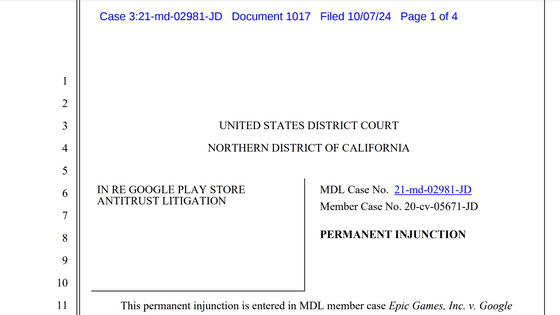As a result of the Google vs. Epic Games lawsuit, 'third-party app stores' can be distributed on Google Play, and Google requests that the order be suspended

The final ruling in a lawsuit filed by Epic Games, the developer of popular games such as 'Fortnite,' against Google over its monopoly on the Android app store, Google Play, was made on October 7, 2024, ordering Google to release the app store for three years.
gov.uscourts.cand.373179.1017.0_3.pdf
(PDF file) https://storage.courtlistener.com/recap/gov.uscourts.cand.373179/gov.uscourts.cand.373179.1017.0_3.pdf

Google must crack open Android for third-party stores, rules Epic judge - The Verge
https://www.theverge.com/policy/2024/10/7/24243316/epic-google-permanent-injunction-ruling-third-party-stores
Why Google is appealing the US Epic Games verdict
https://blog.google/outreach-initiatives/public-policy/epic-games-verdict-appeal/
The Epic Games vs. Google lawsuit began on August 13, 2020, and in December 2023, the jury handed down a verdict in full favor of Epic Games, finding that 'Google created an anti-competitive market through its app store,' and Epic Games' victory was almost certain.
California court rules in favor of Epic Games in antitrust lawsuit against Google - GIGAZINE

The final ruling includes an order outlining what Google must do specifically. For three years, from November 1, 2024 to November 1, 2027, Google must allow third-party app stores that compete with Google Play to distribute their apps within Google Play, and must provide third-party app stores with the full catalog of apps from Google Play.
Google must also allow developers who distribute apps on Google Play the freedom to use their own payment services, link to third-party app stores, and set their own prices. In addition, Google must prohibit 'buying' practices such as distributing revenue to people or organizations who are trying to launch app stores, setting bonuses for 'not distributing apps on third-party app stores,' and forcing device manufacturers and carriers to pre-install Google Play.
Google, on the other hand, has filed an appeal against the ruling, arguing that it 'will put consumer privacy and security at risk and will have a variety of unintended consequences that will harm consumers, developers and device makers,' and has filed for a stay of the order.
Epic Games also sued Apple at the same time as suing Google, and the Epic Games vs. Apple trial ended with Apple's victory. In the Epic Games vs. Apple trial, Apple won, stating that 'iOS's App Store competes with Android's Google Play and is not a monopoly.' Google argued that 'Google Play competes with the App Store,' and further argued that 'Android, unlike iOS, is an open platform that has always allowed choice and flexibility, such as multiple app stores and sideloading,' and that the factual determination of monopoly was incorrect.
Why did Epic Games lose the lawsuit against Apple but win against Google? - GIGAZINE

'The ruling overlooks the obvious: iOS and Android are clearly competitors,' Google said in its complaint.
Related Posts:
in Mobile, Software, Web Service, Posted by log1d_ts






